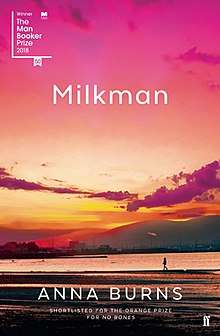Milkman (novel)
Milkman is a novel written by Anna Burns.[1] It won the 2018 Man Booker Prize for Fiction,[2] the first time a Northern Irish writer has been awarded the prize.[3] It also won the 2018 National Book Critics Circle Award for fiction.
 | |
| Author | Anna Burns |
|---|---|
| Country | Northern Ireland |
| Language | English |
| Publisher | Faber and Faber |
Publication date | September 20, 2018 |
| Pages | 368 |
| ISBN | 978-0-571338-75-7 |
Set during The Troubles in Northern Ireland, the story follows an 18-year-old girl who is harassed by an older married man known as the "milkman".[4] The novel received positive reviews from The Guardian,[4] The Daily Telegraph[5] and The Irish Times.[6]
Themes
Politics
In Milkman, everyday behaviours, even non-political ones, are politicised. The protagonist's maybe-boyfriend shows off a new car engine he has bought to his neighbours, only to be marginalised when a few marks on the engine reveal that it was made in Great Britain.
The protagonist's desire to avoid political matters is shown by both her refusal to use character names and her reading-while-walking (quite literally burying her head in a book to emancipate from the reality of The Troubles). Her reading-while-walking tragically manifests itself as a rumour that she is having an affair with the milkman, as whenever other characters fail to understand a behaviour (such as the protagonist's preference for literature over politics) it still becomes politicised through their own interpretations of otherwise mundane facts of life.
Reception
Critical response
The review aggregator website Book Marks reported that 60% of critics gave the book a "rave" review, whilst 28% and 4% of the critics expressed "positive" or "mixed" impressions, respectively. Another 8% of the critics "panned" the book, based on a sample of 25 reviews.[7]
Accolades
The novel won the 2018 Man Booker Prize. Kwame Anthony Appiah, Chair of Judges, commented:
‘The language of Anna Burns’ Milkman is simply marvellous; beginning with the distinctive and consistently realised voice of the funny, resilient, astute, plain-spoken, first-person protagonist. From the opening page her words pull us into the daily violence of her world — threats of murder, people killed by state hit squads — while responding to the everyday realities of her life as a young woman, negotiating a way between the demands of family, friends and lovers in an unsettled time. The novel delineates brilliantly the power of gossip and social pressure in a tight-knit community, and shows how both rumour and political loyalties can be put in the service of a relentless campaign of individual sexual harassment. Burns draws on the experience of Northern Ireland during the Troubles to portray a world that allows individuals to abuse the power granted by a community to those who resist the state on their behalf. Yet this is never a novel about just one place or time. The local is in service to an exploration of the universal experience of societies in crisis.’
References
- "Milkman". Public Store View.
- "Anna Burns wins the 50th Man Booker Prize with Milkman". The Man Booker Prizes.
- Flood, Alison; Armitstead, Claire (2018-10-16). "Anna Burns wins Man Booker prize for 'incredibly original' Milkman". the Guardian. Retrieved 2018-10-17.
- "Milkman by Anna Burns review – creepy invention at heart of an original, funny novel". The Guardian.
- "Milkman by Anna Burns, review: a viciously funny take on the Troubles". The Daily Telegraph.
- "Milkman review: Impressive, wordy and often funny". The Irish Times.
- "Milkman". Book Marks. Retrieved February 16, 2019.